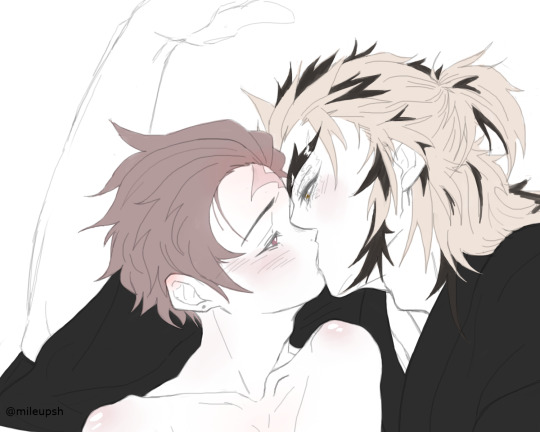sideblog for KNY since we go there now. RenTan, RenKaza, Rengoku. Rengoku. Did I mention Rengoku? Yeah. Icon credit @eggyulksart
Don't wanna be here? Send us removal request.
Text

Tanjiro with his yume ship with Mr.Kyojuro!!! He's always inspired and needs to write his ideas down!!!
48 notes
·
View notes
Text

MERRY CHRISTMAS TANJIRO AND KYOJURO!!
May they smooch forever.
and may you all have a festive Christmas!!!!
37 notes
·
View notes
Note
Hi! I keep seeing people commenting again and again that Rengoku's "Umai" comes from "ancient samurai did it to enjoy every meal as if it were their last one", but I can't find a reliable source on that. Do you happen to know if that's true or it's just one of those fandom rumors that spread around and everyone believes them? Did the Rengokus used to be samurai?
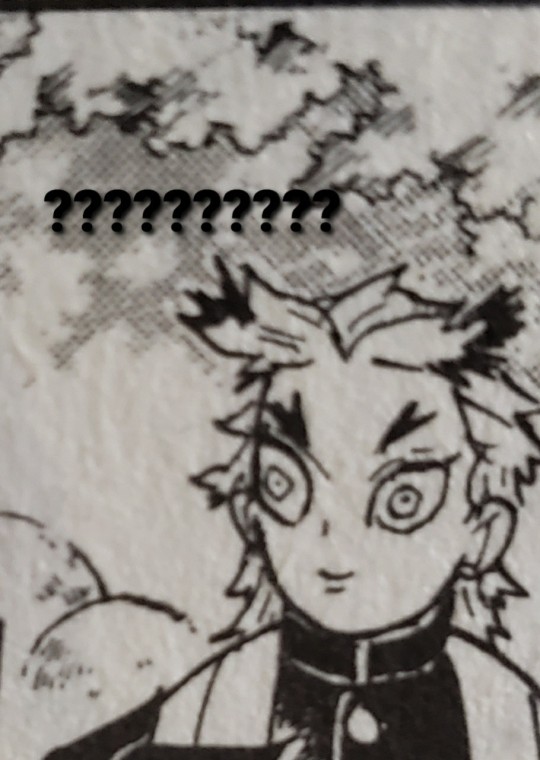
I have... never heard this????? Granted, I don't stray from under my Tumblr rock when it comes to interacting with the wider KnY fandom, so that might be part of it. But I also have been a nerd for samurai since long before KnY might have been a twinkle in a gator's eye, and... I still have not heard this??????? Granted, I am but one nerd on the internet, so there's of course plenty I don't know. So I went looking into this on the Japanese interwebs, found a good handful of articles on the epistemology of the "umai" Rengoku uses and how the usage meaning can vary depending on the kanji it's written in, and...
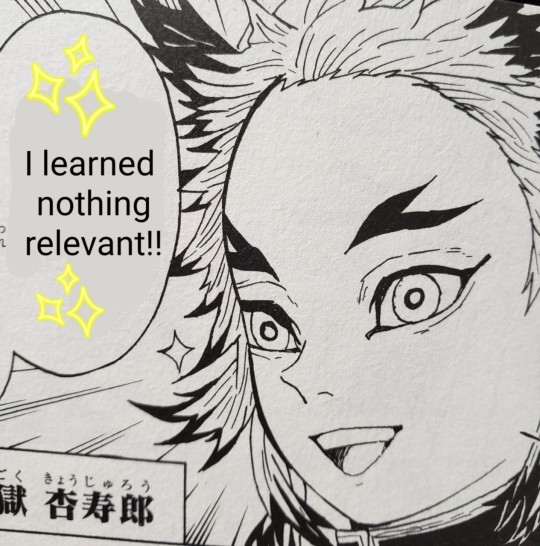
Again, that's not to say there's not something out there, but I couldn't find anything that implied that this started as a samurai-specific phrase with a highly specific meaning behind praising a potential last meal's tastiness. Setting aside the question of the word "umai," though, there is a lot of meat to this interpretation, though. There is a lot of samurai and Zen influence at work in Kyojuro's character, the Rengoku clan, and in Kimetsu no Yaiba as a whole.
Let's start with the question of whether or not Kyojuro (and everyone else in the Rengoku clan) is a samurai. I don't think this is an appropriate phrase for a number of historical reasons as well as reasons in canon. First, to my knowledge, the use of 侍 "samurai" in KnY is limited to context of swordsmen from warrior families (武家 "buke") who would have acted under the title of someone who is a career warrior under the service of a warlord. Child Yoriichi uses this phrase when addressing Michikatsu, saying he wants to be the "second strongest samurai." This is appropriate for them, for as warrior family, they have the social expectations of samurai to live up to. This was back in the Warring States period, but the definition of samurai was a building block of the whole social structure in the Edo period, and being tied in with politics would be problematic for a family committed to an unrecognized/secret organization. The Rengoku clan had their own illustrious family legacies to maintain, their own master they already served separate from whatever warlord is in power, and their own dire mission unrecognized by the political world. Rather than samurai, most of the time the demon slayers (or demon hunters, as they were more commonly called in Yoriichi's day before "Corp" existed as a military phrase) were referred to as swordsmen: 剣士 "kenshi." This is how Yoriichi referred to the Rengoku ancestor who found him after Uta was slain. That all being said, the Rengoku family clearly would had been influenced by samurai culture, so much so that acquaintances might assume they are of the samurai class. Besides the general attitudes, there are many subtle details that make the Rengoku household seem like a buke. You know how excited I was when watching the movie and I saw the garden in Rengoku-san's flashbacks and was like, "ahhhh, look at that, only evergreens, no fading flowers, that is totally a garden appropriate for a samurai abode." "But wait!" you might say. "Cherry blossoms represent the evanescent nature of the samurai, scattering in youthful warrior glory!" Pssh, yeah, that makes it a real inauspicious thing to have in your garden. Sometimes you want a symbol of a samurai's undying loyalty and stuff instead. But the constant awareness of death? Yeah, totally a samurai thing. And that's part of why Zen was so popular with samurai/swordsmen. The more you dig into the samurai psyche about death and constant preparation for it (as well as the struggle to be stoic about it, as opposed to fearing it or being too eager for a glorious death), the more fascinating things you find. Even proper hygiene for making sure your head is a fitting trophy from the battlefield! One method of stoicism found in Zen is mindfulness, and it's actually been on my mind lately how so much of Breath users' abilities does stem from mindfulness (emphasis on the five senses, embracing mundane chores like Tanjiro tending rice as it cooks, heck, even the tree-like state), which would lend itself very well to the interpretation that each meal should be appreciated like your last.
Like, that's one reason the tea ceremony was so popular a practice among samurai too. It draws you attention to the moment. And it's pretty realistic that you'll never encounter a moment like that again with the people you're gathered with. It's the same sort of the approach, and it can absolutely be applied to eating. There is a lot of more general focus throughout KnY on meditation being a source of strength, be it training under waterfalls, Genya repeating the Nembutsu prayer or Ruka practicing Kankagari (meditation done by expectant mothers in the Rengoku clan, staring at a hanging lantern). Breath itself is so, so, so, so closely linked to meditation. It's as though Gotouge is trying to extol the virtues of mastery of the self, and how running away with our passions (perhaps well-meaning, but misguided) is what will make demons out of us. And Kyojuro, who sees good reason for being sad over his father's state, stoically chose mastery over his own emotions. He does not let his potential inadequacies become a passion that rules his heart, and this gives his mind the freedom to adjust quickly to new situations. Kyojuro does tend to live in a state of being in the present, and that means being mindful of an grateful for the details of everything and everyone around him. He accepts not only that he may die protecting his juniors, but that he might also grow old and weak. He neither seeks or flees from either course.
To become a demon would be to let oneself be consumed by passions, ultimately losing that appreciation for our delicate existence. Maybe I wouldn't call him a samurai, but I would feel comfortable calling Kyojuro a 武士 "bushi" (warrior) (albeit the over-idealized bushi mindset took through writings of people who could only look back and admire samurai of the past, and project themselves onto them a bit, but I digress, that's an interesting but irrelevant topic). Not every samurai was a good one, especially as we trickled through the peaceful Edo period, being a samurai was just a happy accident of birth that landed you a civil service position. But for someone who accepted a bushi lifestyle, they accepted that death might always be near. While it's very easy for bushi idealism to be taken to a fanatical level (and for politics, it always has been), KnY lifts up the best of it, with mindful attitudes to strive for even without death constantly down our necks.
192 notes
·
View notes
Text

demon tanjiro... i want him to be angry and unhinged...
152 notes
·
View notes
Text

kyojuro caressing that hilt like he depends on it... there was a couple videos of his mascot holding and rubbing the sword too... sensually.. it was beautiful... unexpected ofc
94 notes
·
View notes
Text

Rengoku is the strongest pillar and support for Tanjiro 🤍🩶🖤

60 notes
·
View notes
Text

Another firefighter kyo.. after his shift...
325 notes
·
View notes
Text

NEW CHRISTMAS OUTFITS FOR THEM!!!
they would eat the clouds and share the stars... happy christmas everyone....
124 notes
·
View notes
Text


firefighter kyojuro... fire breathing fire slayer..
2K notes
·
View notes
Text
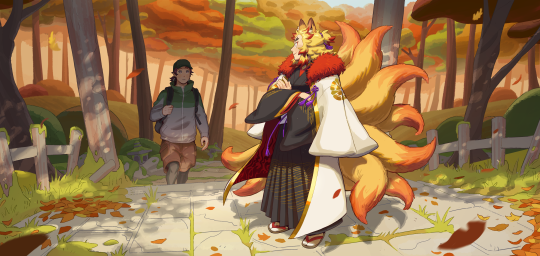
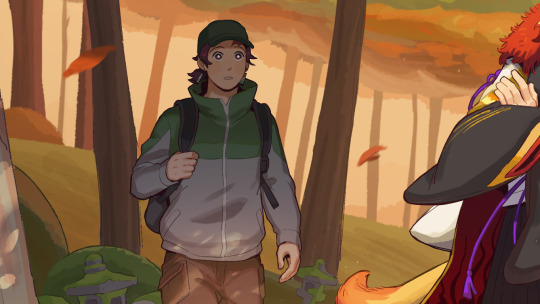
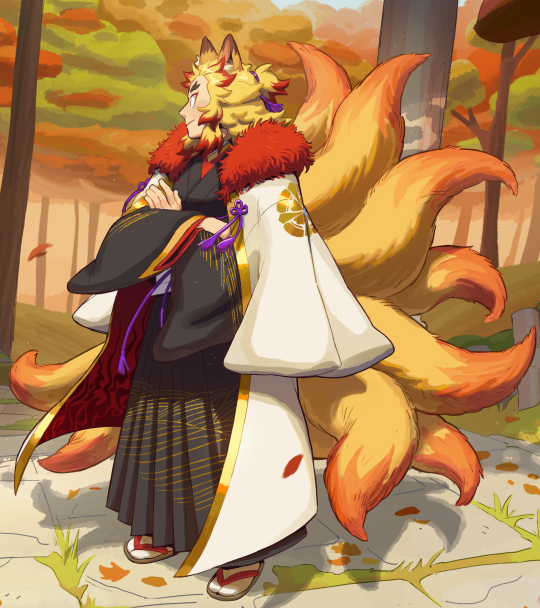
where the shivering god rests by @chininiris
art by @lupinsuniverse
Summary:
"You are a hard man to please, Tanjirou. You will not let me bow, and you will not choose a reward for all you have done for me and this shrine. How am I supposed to show you my gratitude?"
or:
Tanjirou finds an abandoned shrine during a hiking trip and decides to repair it. Its god is pleased and really wishes Tanjirou would accept his offer for a special reward.
426 notes
·
View notes
Text

Tanjiro is always there
24 notes
·
View notes

